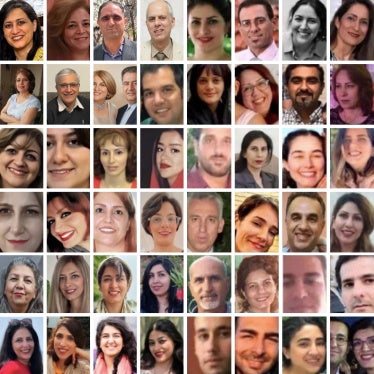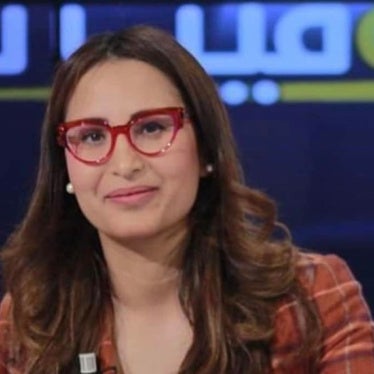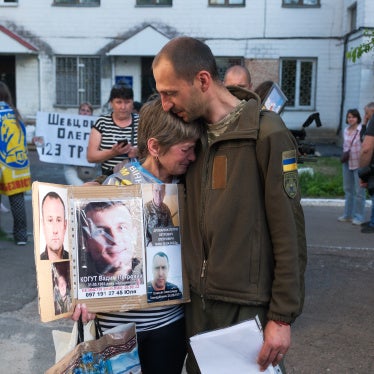On June 4, an Egyptian criminal court sentenced 43 people to prison on charges of membership in illegal organizations. It was a familiar scenario for anyone who worked on human rights under Hosni Mubarak, when activists regularly criticized the roundup of hundreds of Muslim Brotherhood members and their prosecution on the same charges. This time, however, the defendants were Egyptian and international staff of U.S. and German nongovernmental organizations. International law is clear on the issue: Membership in an unregistered organization should not in and of itself amount to a crime.
Yet the Egyptian presidency's latest draft of the new law governing NGOs would not prevent a repeat of the June 4 verdict. The presidency claims that the new draft law has no criminal penalties, yet this is misleading. The draft clearly states that the law's penalties would not supersede the harsher penalties inthe penal code. By this means, the draft law incorporates the vague language of the penal code criminalizing "membership in an illegal organization," allowing staff of these organizations to be charged with a crime for simply going into the office.
The presidency's May 29 draft is better than an earlier horrific draft from the Justice Ministry, and the drafthas improved somewhat over the past two months. The draft, however, is still deeply repressive and violates Egypt's international obligations. This is a technical, not a political, assessment. The key test of an association law is whether organizations will be able to operate freely, without interference from the executive, and independently, with access to funding to enable their survival.
I have followed the passage of this NGO law for two years. Initially, I was cautiously optimistic because the first draft produced in April 2012 by the Freedom and Justice Party, the Muslim Brotherhood's political party, was relatively liberal. By this February, however, when the party submitted its new drafteight months into President Mohamed Morsy's rule, it became clear that the party had changed course. The new draft incorporated some of the worst language on foreign organizations and foreign funding taken from the draft prepared by the Social Affairs Ministry, long a front for the security agencies that monitor NGOs.
The presidency's draftwould reinforce and formalize state control over NGOs by empowering the authoritiesto deny them access to both domestic and international funding. Last week, when I spoke at a side event at the U.N. Human Rights Council in Geneva, the U.N. special rapporteur on freedom of association stressedthat the right of association goes hand in hand with, and depends on, the right to access funding. The presidency's draft law would give the Egyptian government unlimited power to object to any group's domestic fundraising or its right to obtain foreign funds.
The draft law would also give the authorities complete discretion to object to any of the activities of Egyptian and international organizations. If the organization did not comply, the government could take it to court.
Contrary to what a representative of the Egyptian presidency has claimed, the authorities' discretion to object is unlimited in both these provisions. The only requirement is that the objection must be "justified." Under Mubarak, the government's security agencies would often refuse human rights organizations' requests to seek foreign funding to carry out projects on torture, citing unexplained"security reasons" -- and thiswas deemed sufficient.
The draft law containsno safeguards if the government should decide to cripple anorganization working, say, on projects related to early marriage or the rights of religious minorities, by consistently denying it access to funding.Egypt's own human rights community will be particularly vulnerable. Foreign funding has always been its lifeline because, under Mubarak, Egyptian businessmen didn't dare fund a human rights organization.
In contrast, when it comes to the registration of Egyptian groups, the draft law is an improvement on the existing law. It states that the government may only object on two grounds: if the group is involved in military activities, or if its activities are for profit.Had the presidency wished to ensure transparency and protect civil society groups from arbitrary interference, it could have similarly limited to these specific grounds the authorities' powerto object to organizations' activities.
The presidency's draft reflects deep-seated official paranoia about the role of international organizations in Egypt. That paranoia also surfaced during the 2011 uprising, when the military raided a key human rights organization, the Hisham Mubarak Law Center, and detained27 human rights defenders. Later that year, the authorities carried out the raids and investigations of the NGOs that ended in the 43 sentences handed down on June 4. By treating NGO staff as potential foreign agents, this draft law marks the latest example of this unfortunate trend.
International law does not allow governments to discriminate between domestic and international NGOs that are operating legally in their respective countries. The draft law, however, would establisha special committee, whose members would probably include Egypt's security agencies, to "monitor" foreign organizations. The committee could arbitrarily limit international groups' activities on vague grounds such as "national sovereignty" -- an accusation frequently used against groups that criticize rights abuses in Egypt.
The draft even insists that any Egyptian organization wishing to cooperate with an international organization must notify the authorities beforehand. It must also seek the authorities' permission before it canjoin an international organization or entity. Failure to do so would make the organization liable for penalties, including a court order that the group should suspend its activities or, ultimately, facedissolution.
Egypt's transition has been a messy process in which successive governments, including Morsy's, have failed to makecrucial institutional reformsor address issues of accountability and social justice. Police abuses continue: Egypt has witnessed rising deaths in custody and excessive use offorce in dealing with publicprotests, and there has been continuing impunity for police and military crimes. Criminal defamation and blasphemy prosecutions are also rising, and Egypt's parliament is in the process of drafting a repressive demonstrations law that would give the police overly broad discretion to violently disperse demonstrations.
Two years ago, Egyptians stopped being afraid of the police state that Mubarak had erected. This fact still provides the greatest hope that they will persist in demanding social justice, reform, and accountability from their government -- through their elected representatives but also collectively, through groups ranging from small neighborhood associations to high-profile human rights organizations.
A liberal NGO law is key to protecting the human rights community's ability to operate freely. It is also key to empowering development organizations of the sort that Egypt desperately needs, as the economic crisis continues to inflict grave harm on the country's poor. This is ultimately a political choice for the Egyptian president. He can still change course.
Heba Morayef is the Egypt director at Human Rights Watch.







